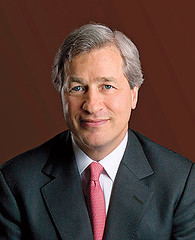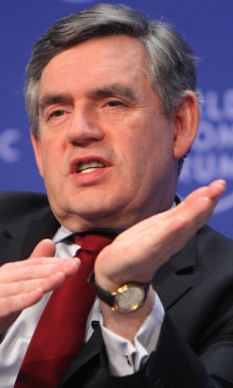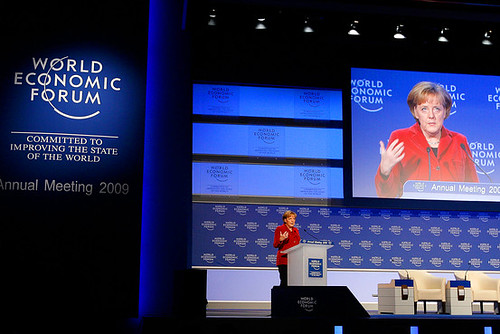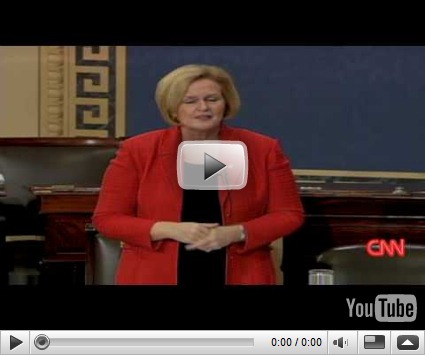Greetings everyone to the second edition of Econ’ Notables & Quotable. We’re still trying to get the kinks out of this, get the format right and what have you. As always, I look forward to your comments and critique. If you have any ideas on how to improve EN&Q, don’t hesitate to let me know. Well, without further adieu, let’s begin the show!
We begin this week’s edition at the Swiss town of Davos, where the World Economic Forum is taking place. There everyone was pointing fingers at everyone. The Russians were saying the Dollar makes the world unsteady and there needs to be alternatives, also Putin knocked down Michael Dell. The Icelanders were hating the British, while the British were hating their own bankers. Everyone blamed Wall Street yet didn’t want to incur a new era of protectionism. Meanwhile, the Turkish Prime Minister decided to call the Israeli President, in front of everyone, a mass murderer; and Turkey is supposed to be the outspoken Muslim ally of the Jewish State!
At Davos

“I take full blame for all the American banks and all the things they did. God knows, some really stupid things were done by American banks .To policy makers, I say where were they? They approved all these banks.”
“One lesson we must learn is that we can not turn the clock back (in finance). If we do, the casualties will be emerging markets which depend on international capital movements.”
- Stephen Green, chairman of HSBC, the global bank which has extensive operations in Asia.
Green echoed many of the folks’ concerns that the era of “free trade” of capital and goods could be over with the recent collapse in equity and credit markets. It has been the latter, that has gotten many concerned, as capital available for major M&A activity to financing of even cargo containers, the picture looked like a financial desert to many. Ok, that’s an exaggeration, as there is room for some merger and acquisition deals. That every was scared to be on the other side of the deal was putting it mildly.Adding to that was the prospect of firms, that is money center banks and other institutional outfits, paring back or “deleveraging” from their usual activities. Players had to step in, facilitate trades and such. Bottom line, fear of one party or country not helping the other seems to be the theme so far.
 “If we don’t do that, then there’ll be deleveraging equivalent to a deglobalisation where the loss of capacity will restrict the growth of the world economy,”
“If we don’t do that, then there’ll be deleveraging equivalent to a deglobalisation where the loss of capacity will restrict the growth of the world economy,”
- UK Prime Minister, Gordon Brown, in an interview with the Financial Times at Davos.
“If bank deleveraging continues at this pace, the effect on the economy will be extremely devastating,”
Of course not all business transactions have been severely curtailed. As previously mentioned above, there is room for some deals. The economy being what it is, many firms that are struggling could find themselves pairing up with others who are of equal or better health in hopes of surviving. But of course, do adding two sick companies together equal a healthy one? Some industries are thinking along those same lines. Indeed, many stronger players are using this time to take out rivals who are in a weakened position.
"We're going to see further waves of consolidation as weaker players are taken over by stronger players,"
- Mark Foster, global head of management consulting at Accenture.
"There will be a lot of opportunities. The key question is what is good to do for the good of the company and I think we should be very cautious about opportunities and not run too fast,"
“Acquisition finance remains tight and many private-equity firms are no longer able to fund deals through cheap debt, which plays into the hands of companies with internally generated funds, according to "CEOs are focusing on the fact that this is a good time to gain market share but clearly they are not got to do it at any price, I think people are going to be looking for opportunities but they are obviously more risk-averse. They are going to want to be confident that the opportunities are secure and well-priced."
- Tony Poulter, global head of consulting at PricewaterhouseCoopers.
"A deep recession for 2009 is already baked into the cake. We've had an asset bubble burst that's not going to turn around no matter how much governments spend. The long history of international financial crises tells us if you don't clean up the mess in the banking system decisively, you're not going to escape a long stagnation.”
- Kenneth Rogoff, a Harvard University economics professor who gave a speech at Davos

(Copyright 2009, Associated Press)
"We need clear-cut rules world-wide,"
"In the end, what we want is a financial industry and banking-sector industry where you have more capital, less debt, more rules and much stronger supervision,The only thing we can do to help restart the market is to tell the world that there are certain kinds of real products that are simple to understand, easy to price and satisfy certain legal conditions"
“There’s a ‘Great Gatsby’ quality to Davos. When people look back at this gilded age, I’m sure there will be images of the investment bank parties at Davos, just as people looked back at flappers after the 1920s. People are still in denial.”
Across the globe, An Economic Reckoning?
The current economic crisis has already claimed an entire government, in of all places, an island nation once known for its stability.
"I would hope that any new government would stick with the current IMF deal because otherwise the future for Iceland is even bleaker economically,"
- Lars Christensen, head of emerging markets research at Danske Bank.
"This will obviously increase volatility because it is unclear who will be running the new government or how the political situation will change."
"But already the country is in a deep economic crisis and they have got the money from the IMF so they are already bound (by the terms of the IMF deal). It is a legal commitment."
"It will be very interesting to see in the election campaign how the economic crisis will be used to gain some votes."
Across in Asia, sadly, things there are not look as well.
Economic destruction in Japan is assuming Godzilla-like proportions. Industrial production fell almost 10 per cent in December compared with November. That’s a big number but it gets worse. The government re-did its forecasts for January to a 9 per cent drop, and February down another 5 per cent. In all, that knocks almost a third off output since September, putting it back, as Macquarie notes, at 1983 levels. In other words, it took a quarter of a century to reach levels that were unwound in the space of five months. For carmakers, it is even worse: production may halve from last year. Japan is not the only postwar miracle whose decades of toil are crumbling
- The Lex column on Japan, in the Financial Times, January 30th, 2009
Meanwhile over here on Banking
The situation on banking in this country, depending on where you looked, either looked as if the whole system of money lending was doomed to folks saying this are actually fine. Something tells me, though, that the true answer is somewhere in the middle.
"Unfortunately, with an unprecedented meltdown in mortgage credit and a deep recession in the broader economy, there is a great deal of uncertainty about the value of almost every asset,"
Ruminations of what the new Obama Administration will do about the current banking crises made its way across The Street. Everyone now believes that the Troubled Asset Relief Program (TARP) is not enough. That to continue on operations will cost the US taxpayer at least $1 Trillion US Dollars, and that so far is being conservative with the numbers. Chief amongst these costs will be the acquisition of those bad assets, that is the primary goal to bring the banks’ balance sheets into some form of sanity. New York Senator, Charles Schumer, noted that perhaps upwards of $4 Trillion would be needed.
For this author, it casts a light on an even scarier image, that really we have no true grasp of the final costs of these bad assets. Are we over stating it? That it could actually be far less? Take the credit derivative swaps that everyone like to point at as the hemlock to our financial system. The total market value has been quoted from anywhere from $30 trillion to as high as 400 trillion, which even on the low end would encapsulate the GDP of the entire planet! Yet in reality, and something the press likes to leave out either because they want to cause a stir or are just ignorant, many of those positions are offset; yet because of the nature of how the transactions were executed, we have no clear picture on how much was offset. And this brings us back to our original question, are we overshooting this or underestimating the true cost? The potential to screw this up is great. It could be that no matter what we do, it may not make a difference. Everything will rest on that "bad bank” to gobble up those toxic assets and see them later sold to investors, as the government doesn’t want to be holding these for the long term.
"If things turn out so bad that the Fed ends up on the hook for $1 trillion in losses, then the financial sector, the economy, and everything else will be dead anyway,"
Now so far we’ve been grousing about banks receiving relief from the tax payer, but there was another type of financial “reciprocity” that was talked about this past week. Yes, ladies and gentlemen, we’re talking executive compensation! Since October, no wait, since Bear Stearns fell in March of ‘08, we’ve been made to worry about the banks. Everyday we hear about another bank closing its doors, these reports are bathed in further reports of home foreclosures and job cuts across the economy. Anxiety would be putting it mildly. Then came the TARP, what was sold to us at the time (and for full disclosure, I was originally a supporter of) as the be all and end all to our worries. Lehman had just joined the USSR, American Motors and the Roman Empire in the trash bin of history. Crises begat solutions, or at least proposals promoted as such. $700 billion we were asked, you and I, the tax payer, to save the banks (and our bacon). Never before, in the history of this republic, was so much money requested in such a short manner; even FDR’s New Deal didn’t approach the amount of money or even the timetable for expenditure! This was a big, like a bet at Vegas, and the tax payer was told he needed to roll a hard 6!
Laying out that kind of money gets people’s attention. In the past, the average citizen would act shocked and such when we spent this or that on something, but then would shrug it off, this would be especially true if the economy were doing well and he or she had a job. There have been a few exceptions to the rule, especially when John Q. Citizen is reminded on a daily basis of the cost of something. So it comes to no surprise that anger would build up when one of those banks getting our money decided to buy some very expensive perks for one of it’s executives. You see, despite all that has happened, the Masters of the Universe have lived in their own bubble. They were used to being spoiled like some professional athlete or some pop star. But something changed, and like the Apparatchiks and Commissars of the old Soviet Union entrenched inside the Kremlin machine in the late 1980s, the world started on a new geo-economic and political phase and they failed to see it. Perhaps it went by them too fast, coddled on the same good old entrenched buddy network at the top that ironically helped Bernard Madoff, most could not realize that their world just ended.
But there it was…anger, anger at their perceived callousness of the situation. You see, this time, it wasn’t just a bunch of ragtag anarchists marching on some street in Seattle. The Masters of the Universe managed to piss off a force much more powerful, a force made up of all those who either lost their money in their 401ks as the market cratered, to those who felt cheated by some crazy mortgage scheme. But above all, the backbone of this new power were the ones forced to make that $700 billion dollar bet.
"Going forward if you want taxpayers to help you survive, if you want the people at your financial institution to have a job tomorrow, then you're going to have to limit everyone's pay at your company to the same salary that the President of the United States makes, now once they're off the public dole, once the taxpayers aren't footing the bill, then it's not as much our business what they get paid. But right now they're on the hook to us. And they owe us something other than a fancy waste basket and $50 million jet"
- Sen. Claire McCaskill in a speech before the Senate floor to promote the Cap Executive Officer Pay Act of 2009
Reaction to the bonuses and other luxuries anointed to banking and other financial executives who federal tax dollars have been swift. The above is just one one example, and one such that will have a lasting impact. The Cap Executive Officer Pay Act of 2009 would ban compensation levels, for a company, above that which the President of the United States gets, if the company in question is receiving TARP or other such funding. Others on The Street, seeing how out of touch to the current political climate some of their colleagues are, are warning to reign in the goodies before it’s too late.
“Even if the returns they generated were real, they were paid too much, and in the context of the absolutely disastrous performance of these institutions their pay was obscene”.
- David Swensen, the chief investment officer of Yale University’s endowment
From the hallowed halls of Economic Populist, quote of the week from the comments section
While you are wondering....
...ask yourself how much help this sort of thing is to independent contractors and the self-employed.
As per usual the gummint is way behind the curve on significant changes in society and the workforce.
There is no wondering to be done on why the Corporate Slave State luvs them some 'independent contractors...' and the Republicrat cartel love to bloviate about 'American small business...', that's me, the self-employed but there is no safety net for me.
Obama and his folks seem no more knowledgeable in this area.
Or am I missing something in the 'stimulus package' which would help me?



Comments
Jamie Dimon
At least he had some guts to say it (although Chase still is predatory lending, esp. on credit cards!) ...
check out the dailyshow clip in the Sunday Morning comics...
Stewart nails it on these executives completely out of reality that somehow they are the "best and the brightest" or the "cream of talent", hence deserve billions in bonuses.
Nice pull of A. Citizen's quote....this is assuredly one of the biggest hidden labor issues going on in the U.S. use of tax categorizations, permatemp to deny benefits, full wages.
Wow!
This is like being 'mentioned in dispatches...'. Thanks to NDD and the rest.
I have a busy week ahead but after I switch my Wordpress blog to .com I will be blogging more about this.
Lots and lots of us self-employed our here and we are...
...not happy with the situation.
'When you see a rattlesnake poised to strike, you do not wait until he has struck to crush him.'
your blog
cross posting of "big meat" posts is aok, just change the title a tad and the first couple of lines to "fake out" the various SEO and aggregators. These automated systems "punish" copies and give lower page rank due to so many idiots out there thinking they will "get rich" on the Internets by running a blog and outright copy other people's work.
So, that's the way to "fake out" the aggregators in legitimate exposure techniques.
Then, put a link over to your blog. That helps give your "home base" more exposure. See user guide for more tidbits and admin forum.
Will confer with you...
...so as to get this right. I don't expect this to happen soon. Still sick and still busy being 'self-employed'....hah...
'When you see a rattlesnake poised to strike, you do not wait until he has struck to crush him.'